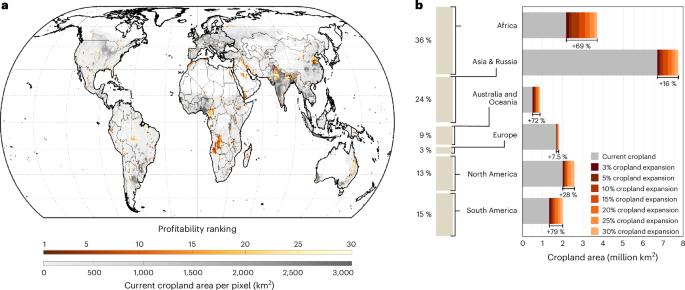Effects of profit-driven cropland expansion and conservation policies
IF 25.7
1区 环境科学与生态学
Q1 ENVIRONMENTAL SCIENCES
引用次数: 0
Abstract
Biodiversity protection and climate change mitigation require understanding of the potential trade-offs from possible future cropland expansion. Here we apply an interdisciplinary coupled modelling approach to identify areas under the globally highest expansion pressure of 1% to 30% future cropland expansion by 2030. On the basis of recent projections, we analyse the potential impacts on agricultural markets, biodiversity and CO2 land-use emissions of a 3.6% global cropland expansion scenario by 2030. We assess how global conservation policies could shift expansion pressure and alter the ensuing impacts. Our results confirm that the areas under pressure are located mainly in the tropics. A cropland expansion of 3.6% increases global agricultural production by 2%. The associated land-use change generates 17.1 Gt CO2 emissions and leads to a further decline in biodiversity intactness of 26% in the expanded areas. Conservation policies prohibiting the expansion into forests, wetlands and existing protected areas could substantially reduce emissions from land-use change, maintaining global agricultural productivity, but might have contrary effects on biodiversity. Strategic land-use planning could help reconcile agricultural production with environmental protection. The map of areas under expansion pressure presented here could contribute to improving the spatial planning of conservation measures. Understanding the various and multiple trade-offs of land-use changes and cropland expansion can contribute to more sustainable policies. A study explores future scenarios of cropland expansion along with the trade-offs in agricultural production and markets, biodiversity and CO2 emissions.

利润驱动的耕地扩张和保护政策的影响
保护生物多样性和减缓气候变化需要了解未来耕地扩张可能带来的权衡。在此,我们采用跨学科耦合建模方法,确定了全球耕地扩张压力最大的地区,即到 2030 年耕地扩张 1%-30%。根据最近的预测,我们分析了到 2030 年全球耕地扩张 3.6% 的情景对农业市场、生物多样性和二氧化碳土地利用排放的潜在影响。我们评估了全球保护政策如何转移扩张压力并改变随之而来的影响。我们的结果证实,受到压力的地区主要位于热带地区。耕地面积扩大 3.6%,全球农业产量增加 2%。与此相关的土地利用变化会产生 17.1 千兆吨二氧化碳排放,并导致扩大地区的生物多样性完整性进一步下降 26%。禁止向森林、湿地和现有保护区扩张的保护政策可大幅减少土地利用变化产生的排放,维持全球农业生产率,但可能会对生物多样性产生相反的影响。战略性土地利用规划有助于协调农业生产与环境保护之间的关系。本文介绍的面临扩张压力地区的地图有助于改善保护措施的空间规划。了解土地利用变化和耕地扩张的各种多重权衡,有助于制定更具可持续性的政策。一项研究探讨了未来耕地扩张的情景,以及农业生产和市场、生物多样性和二氧化碳排放方面的权衡。
本文章由计算机程序翻译,如有差异,请以英文原文为准。
求助全文
约1分钟内获得全文
求助全文
来源期刊

Nature Sustainability
Energy-Renewable Energy, Sustainability and the Environment
CiteScore
41.90
自引率
1.10%
发文量
159
期刊介绍:
Nature Sustainability aims to facilitate cross-disciplinary dialogues and bring together research fields that contribute to understanding how we organize our lives in a finite world and the impacts of our actions.
Nature Sustainability will not only publish fundamental research but also significant investigations into policies and solutions for ensuring human well-being now and in the future.Its ultimate goal is to address the greatest challenges of our time.
 求助内容:
求助内容: 应助结果提醒方式:
应助结果提醒方式:


